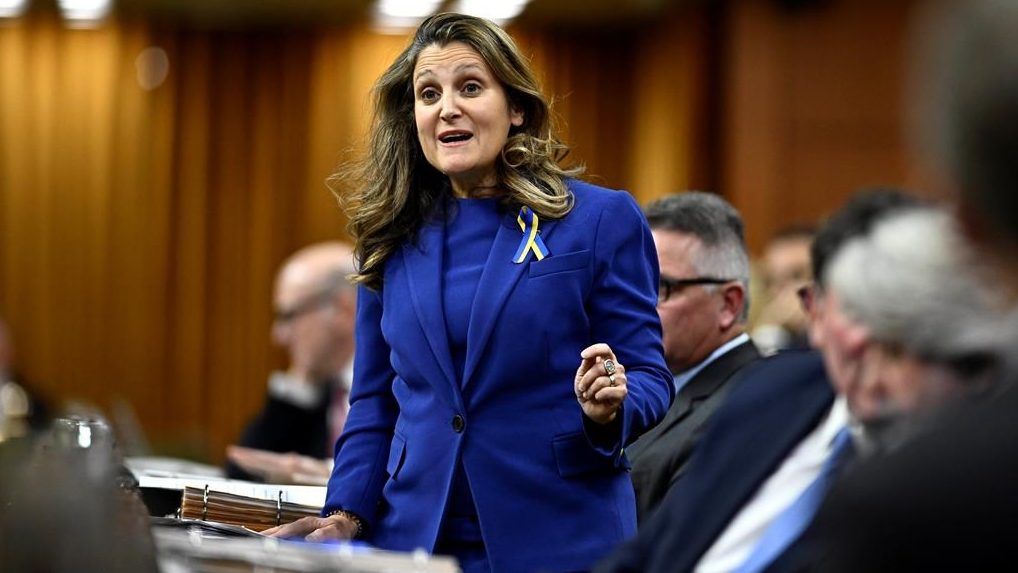Former PM Brian Mulroney appeals for fearless leadership on resource agenda
Posted April 8, 2014 8:58 pm.
This article is more than 5 years old.
OTTAWA – Brian Mulroney says the country needs risk-taking leadership to get domestic oil and gas moving overseas, as well as a plan to work co-operatively and bring Canadians onside.
The former Tory prime minister’s speech Tuesday, organized by the progressive think-tank Canada 2020, comes as major pipeline projects languish in limbo.
They have been stymied largely by opposition from First Nations, environmentalists and ordinary Canadians concerned with the impact on their communities.
“Prime ministers are not chosen to seek popularity. They are chosen to provide leadership,” Mulroney told a rapt crowd that included politicians of all stripes.
“Leadership is the process, not only of foreseeing the need for change, but of making the case for change. Leadership does not consist of imposing unpopular ideas on the public but of making unpopular ideas acceptable to the nation.”
Stephen Harper’s Conservative government has faced criticism for not doing enough to create consensus and allay environmental concerns at home and in Washington. Environmentalists have been referred to as “radical groups,” and the official Opposition as “treacherous” and “clowns.”
Mulroney pointedly urged a more collaborative approach to resource development, saying there needs to be agreement of all the players including the First Nations, the provinces and environmental groups.
“Canada is a vibrant federation. We are not a unitary state,” Mulroney said. “The Government of Canada cannot act unilaterally to resolve this matter.”
Mulroney noted the need for Canada and the United States to work collaboratively on both energy security and the environment, to “set a new gold standard on environmental performance.”
“I can envisage a new North American Accord on Carbon Emissions, one that invokes the spirit of what we did successfully together to combat acid rain…and to clean up the Great Lakes, huge environmental achievements,” said Mulroney, noting he had once been honoured as the greenest prime minister in history.
Earlier in the day, Washington’s new ambassador to Canada, Bruce Heyman, also called for more collaboration on the environment.
“Today you can be pro-economy and pro-energy and considerate of the environment,” Heyman told reporters.
Mulroney addressed Heyman directly in his speech at one point, telling him that Canada fully expects the United States approve the Keystone XL pipeline, and live up to its obligations under NAFTA.
“I know you’re not going to approve it sir, but when you’re talking to President Obama, send him my love,” Mulroney said wryly.
Mulroney is suggesting that the government form a Resource Development Office drawing expertise from across the country, and led by a high-profile person with the “absolute confidence and persistent attention of the prime minister.”
He likened such a body to the Trade Negotiations Office that his government formed to smooth the free-trade talks with the U.S.
The government already has a Major Projects Management Office, which is supposed to see resource projects to fruition.
Mulroney pointed to the lack of a “concrete action plan and an enhanced spirit of partnership” in the Ring of Fire mining project in northern Ontario.
Plans to develop the massive chromite deposit are on ice for now as First Nations, the provincial government and the federal government struggle to figure out how to develop the region, who should pay for infrastructure and how the benefits of the resource should be shared.
Mulroney’s speech drew a wide variety of politicians. High-profile members of the federal cabinet in attendance included Defence Minister Peter MacKay, Foreign Affairs Minister John Baird and Immigration Minister Chris Alexander.
The relationship between Harper and Mulroney has hit some serious rough patches over the years. In 2007, Harper called for a probe of Mulroney’s dealings with shady German businessman Karlheinz Schreiber.
The inquiry eventually found that Mulroney had acted in an inappropriate way when he accepted cash-stuffed envelopes from Schreiber to do internal lobbying after he left office. Mulroney said it was an error in judgment.
At one point in 2009, figures around Harper even tried to suggest Mulroney was no longer a party member — a move that provoked a backlash inside the caucus where Mulroney still has his fans.
The former prime minister complimented the Harper government a handful of times, most notably on its approach to “the lawless takeover of Crimea” by Russia.
But Mulroney struck a largely non-partisan tone, and spoke about how governments of different stripes have acted in the national interest and continued the policy work of their predecessors. He pointed to the presence in the room of Green party Leader Elizabeth May, who had once worked for him, and also to former NDP leader Ed Broadbent.
“The essential continuity of governments from Mulroney through Chretien and Martin to Harper explains a great deal of what is right about Canada today.”










